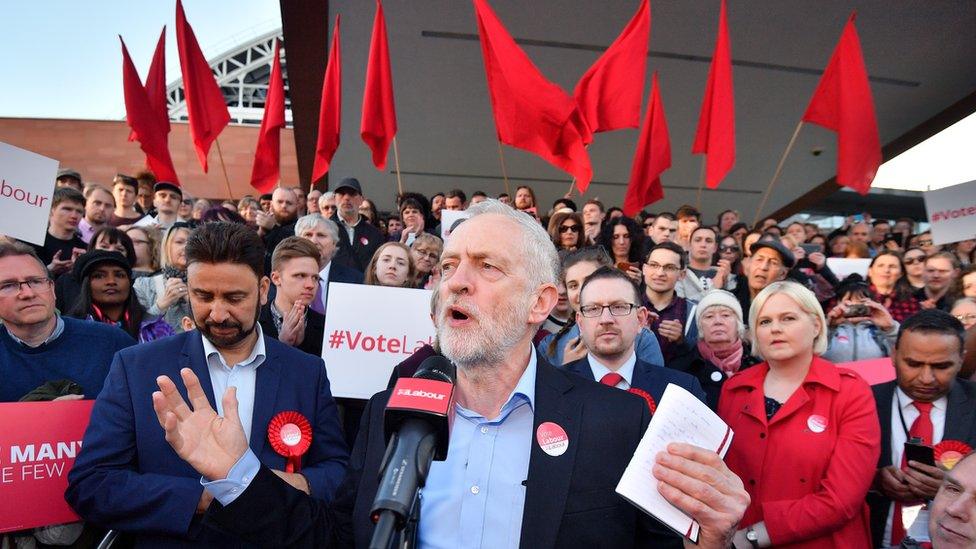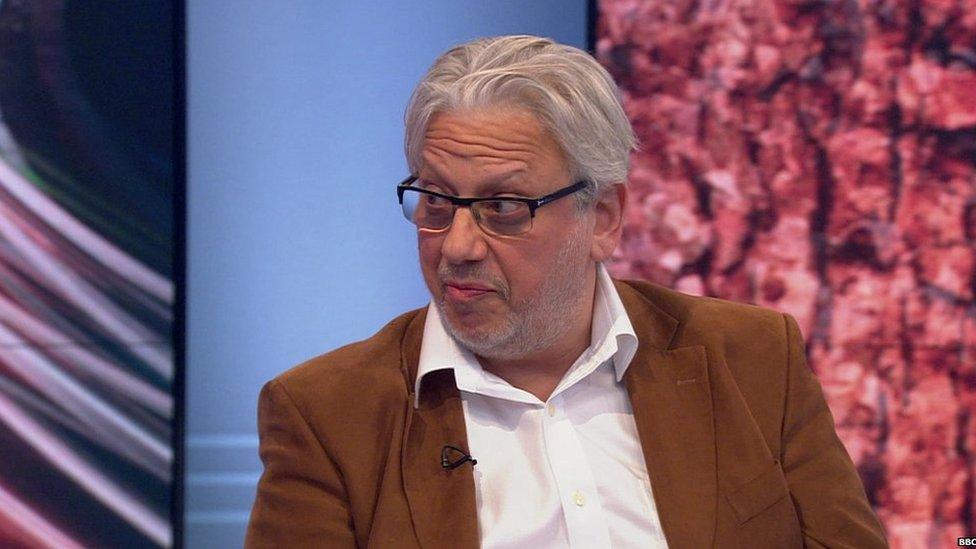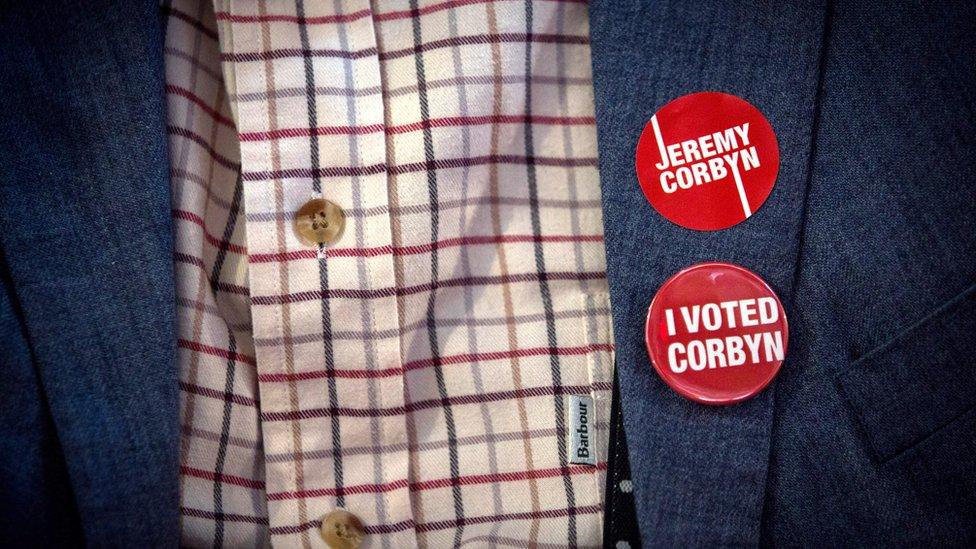What Momentum’s wins might mean for Labour
- Published

Jeremy Corbyn-supporting Momentum members won elections to Labour's ruling executive this week
He has moved from the margins to the mainstream. A left-wing activist for more than 40 years, Jon Lansman was elected to Labour's ruling body for the first time on Monday.
As the founder of Momentum - the grassroots group that aims to keep the spirit and politics of Jeremy Corbyn's initial leadership campaign alive - he has been instrumental in shifting the centre of political gravity away from Labour's MPs and towards its activists.
After winning his place on the ruling National Executive Committee, he promised to use his position to "push for a massive expansion in Labour's community organising programme".
"For too long, politics has been top-heavy and Westminster-centric," he said.
"We need a socialist Labour government that works in tandem with experienced activists on the ground, who understand their communities and are given the resources and training to transform them for the better."
But some of his internal opponents - who would describe themselves as moderates, or centrists - believe his ambitions go far further.
They say what might seem like an obscure development in a meeting room at Labour's HQ demonstrates a willingness by Jon Lansman's Momentum allies to flex their political muscles.
Disciplinary panel
Ann Black may not be well-known outside Labour circles but often comes top or near the top of the ballot for election to the party's NEC and - until lunchtime on Tuesday - chaired its powerful disputes committee.
She's not on the right but the left of the Labour Party. However, she had irked some in Momentum when she had agreed to rules which made it harder for newer members to vote in the second Labour leadership election - potentially favouring Jeremy Corbyn's opponent, Owen Smith.
So she was ousted in what was described as "a pointless and divisive move" by a left-wing member of the NEC. She was replaced by Christine Shawcroft - a leading figure in Momentum.
The group couldn't do this on its own - representatives of unions such as Unite, as well as shadow cabinet members, backed the change.
But there are concerns among Labour members who see themselves as moderates that a similar alliance will try to change the party's rules to make it easier to ditch MPs who continue to be unenthusiastic about Jeremy Corbyn's leadership.
The party is currently undertaking a "democracy review" - a look at its internal structures - under the auspices of Katy Clark, the former MP who is now the Labour leader's political secretary.
Reselection row
But the terms of reference of her review do not include what's known as the "mandatory" - or automatic - reselection of Labour MPs.
And I understand some of the representatives of the trade unions on Labour's NEC which are usually supportive of Jeremy Corbyn - and who voted for the removal of Ann Black - wouldn't back changing the rules on parliamentary selections.
So even if the moderates' fears were realised and Jon Lansman and his Momentum colleagues did want to add this issue to the party's democracy review, they would potentially face defeat - or, at the very least, delay until after this year's Labour conference.
But Richard Angell of Progress - seen as a moderate or modernising group by its members but criticised as a Blairite faction by its internal opponents - argues that Jon Lansman is not someone who respects due process: "He is in a hurry and he will push home his advantage.
"He knows if his support can build so quickly, it can recede as quickly."

Jon Lansman, Momentum's founder, is now a member of Labour's NEC
He cites the re-opening of councillor selections in Birmingham as an example of where the party has given in to pressure from the left.
And he warns that sitting Labour MPs could still face a challenge under existing rules - where local members already have the power to "trigger" an open contest and make MPs compete against all-comers.
But left-wing union sources agree with Richard Angell on one point - there could be a practical constraint on this.
The Progress director told me: ''The party wants to go into the next election appearing to be united. If well-known hard-working MPs - some of whom get 80% of the vote - are deselected, that will be a big sign, a siren sounding, to tell potential voters that the party they supported - a Labour Party they recognise - has changed.
"Those voters won't necessarily accept whatever candidate is foisted on them. And with Labour and the Tories deadlocked in the polls this might just be the game-changer the Conservatives are looking for."
So if the polls remain tight, this may not happen.
There has also been both dismay and disbelief amongst anti-Corbyn parliamentarians over press reports that MPs who are deselected would sit as independents. The number of MPs who seem willing to consider this doesn't quite make a handful.
There are various reasons why it is unlikely that this number would expand.

Jeremy Corbyn supporters are increasing their presence on Labour's internal committees
Looking at marginal seats which are currently selecting candidates, there has not exactly been a clean sweep for left-wing aspirants.
In many areas former candidates, prominent councillors and even a former MP have been chosen over Momentum-backed alternatives.
So even where sitting MPs may be challenged, there is no guarantee that they would lose a ballot of local members.
That suggests that mass deselections are probably not on the agenda.
Nonetheless, some MPs may well be chucked out - though there is a view that this might be due to their performance (or lack of it) as much as their politics. But if, as one moderate put it, they then "sit in a huff, that might simply expose just how few followers they have".
A Labour source was more blunt: "If these people are currently keeping their head down, why would they suddenly grow balls just because they had been deselected? They won't break ranks."
The former MP Simon Danczuk stood as an independent at the 2017 election and lost his deposit - gaining fewer than 900 votes - so in the absence of a plan to create a new centre party, there seems little incentive for MPs who are deselected to sever their ties with Labour rather than stay and fight.
And some Corbyn-sceptics believe there is a lot to fight for.
One Labour MP pointed out to me that four out of five party members didn't take part in the NEC elections so while Momentum "has the activist base it doesn't have the full membership.
"There's lot to play for."
And a leading MP who backed Eddie Izzard's unsuccessful bid to be elected to the NEC is suggesting that the party's "moderate" members have to play a smarter campaign.
They, too, thought that Jon Lansman's vote was lower than anticipated and thought it was significant that the comedian got more voters than any other candidate, apart from the three who had Momentum's backing.
"Eddie fought a non-tribal, non-factional campaign around issues of diversity. He made it clear he'd campaign to get Jeremy Corbyn into Downing Street."
The MP's view was that moderate colleagues shouldn't just bang on about the threat of deselections but promote a more positive agenda that might appeal to enthusiastic new members who find Jeremy Corbyn's leadership inspiring - but aren't fully signed up to following a line from Momentum.
"If we fight the leadership in the same way as before we will get the same result."
So they are hopeful that with a more inclusive and less confrontational approach, at least some moderate candidates will get elected to the party's ruling body next year.
The next leader?
But right now Jeremy Corbyn has a National Executive Committee that has never been more supportive of him.
And even if his review of party democracy doesn't extend to turfing out MPs, it could make a significant difference to how the party organises itself.
Up for discussion in the third phase of the review - later this year - is the question of how the party elects its next leader.
The elevation of three Momentum-backed candidates to the NEC makes it more likely that MPs' influence in the process is further diminished and someone who shares the current leader's politics succeeds him.
As part of the review, the Labour First group - which sees itself as moderate and opposes Momentum - has called for the reintroduction of an 'electoral college', which hands more influence back to elected politicians, but this seems unlikely to be successful given their weakened position on Labour's ruling body.
But while there is likely to be more press scrutiny than ever before of Labour's internal structures - and while Jon Lansman's NEC victory is symbolic of a political shift within the party - in many ways Labour's tectonic plates have already moved.
Momentum supporter Owen Jones and Progress director Richard Angell on Labour candidate selection
The big political earthquake was, of course, Jeremy Corbyn's initial election victory. But a series of moves that haven't registered as highly on the political Richter scale are also significant.
He has shifted policy so that even the former Blairite minister Lord Falconer can declare "we are an anti-austerity party".
The unexpectedly good showing in the general election has been taken as an endorsement of policies to extend public ownership.
The Carillion collapse has helped make the case for bringing PFI and other contracts back in-house.
Privately I know Labour MPs who worry about the effect this might have on public borrowing. Publicly, they remain silent.
And that biting of tongues suggests that it might be an unnecessary distraction for activists to try to deselect MPs.
Many may not actively assent to key aspects of the party leadership's developing policy platform - but they are not risking dissent either.